Related Research Articles
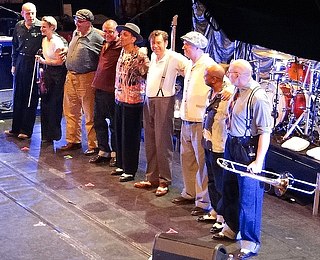
Dexys Midnight Runners are an English pop rock band from Birmingham, with soul influences, who achieved major commercial success in the early to mid-1980s. They are best known in the UK for their songs "Come On Eileen" and "Geno", both of which peaked at No. 1 on the UK Singles Chart, as well as six other top-20 singles. "Come On Eileen" also topped the US Billboard Hot 100, and with extensive airplay on MTV they are associated with the Second British Invasion.

Kevin Rowland is a British singer and musician best known as the frontman for the pop band Dexys Midnight Runners. The band had several hits in the early 1980s, the most notable being "Geno" and "Come On Eileen", both of which reached number one on the UK Singles Chart.
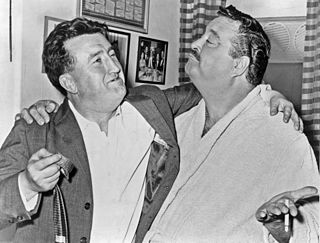
Brendan Francis Aidan Behan was an Irish poet, short story writer, novelist, playwright, and Irish Republican, an activist who wrote in both English and Irish. He was named by the US website Irish Central as one of the greatest Irish writers of all time.
"Whiskey in the Jar" is an Irish traditional song set in the southern mountains of Ireland, often with specific mention of counties Cork and Kerry. The song, about a rapparee (highwayman) who is betrayed by his wife or lover, is one of the most widely performed traditional Irish songs and has been recorded by numerous artists since the 1950s.
Ceoltóirí Chualann was an Irish traditional band, led by Seán Ó Riada, which included many of the founding members of The Chieftains. Ceoltóirí is the Irish word for musicians, and Cualann is the name of an area just outside Dublin where Ó Riada lived. Ó Riada's work with Ceoltóirí Chualann is credited with revitalizing the use of the bodhrán as a percussion instrument in Celtic music.
"The Town I Loved So Well" is a song written by Phil Coulter about his childhood in Derry, Northern Ireland. The first three verses are about the simple lifestyle he grew up with in Derry, while the final two deal with the Troubles, and lament how his placid hometown had become a major military outpost, plagued with violence. The final verse includes a message of hope for a "bright, brand new day", saying "They will not forget but their hearts are set / on tomorrow and peace once again".
"The Patriot Game" is an Irish ballad with lyrics by Dominic Behan and a melody from the traditional tune "One Morning in May", first released in 1958.

Searching for the Young Soul Rebels is the debut studio album by English soul group Dexys Midnight Runners, released on 11 July 1980, through Parlophone and EMI Records. Led by Kevin Rowland, the group formed in 1978 in Birmingham, England, and formed a strong live reputation before recording their first material. Recorded during April 1980, the album combines the aggressiveness of punk rock with soul music, particularly influenced by the Northern soul movement.
"The Water Is Wide" is a folk song of Scottish origin. It remains popular in the 21st century. Cecil Sharp published the song in Folk Songs From Somerset (1906).
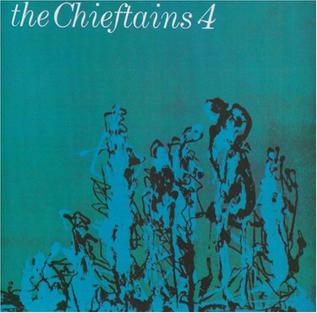
The Chieftains 4 is an album by The Chieftains. It is the first album to feature Derek Bell on the harp. This album is where The Chieftains' modern sound began.
"Mná na hÉireann" is a poem written by Ulster poet Peadar Ó Doirnín (1700–1769), most famous as a song, and especially since set to an air composed by Seán Ó Riada (1931–1971).
Óró, sé do bheatha abhaile or Óró, sé do bheatha 'bhaile is a traditional Irish song, that came to be known as a rebel song in the early twentieth century. Óró is a cheer, while sé do bheatha 'bhaile means "welcome home".
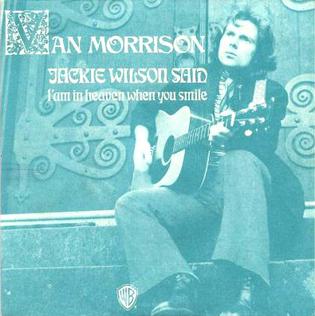
"Jackie Wilson Said (I'm in Heaven When You Smile)" is a song written and performed by Van Morrison and featured as the opening track on his sixth studio album, Saint Dominic's Preview. It was released by Warner Bros. in July 1972 as the first of three singles from the album and charted at number sixty-one on the US Billboard Hot 100. Both the music and lyrics are inspired by rhythm and blues singer Jackie Wilson and his song "Reet Petite", which is directly quoted in the song.
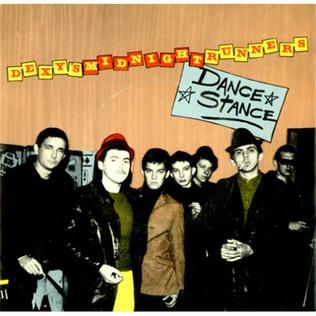
"Dance Stance" is the first single by Dexys Midnight Runners. Written by frontman Kevin Rowland, The song was released in 1979 on the independent label Oddball Records. It reached #40 on the UK Singles Chart in early 1980.
"I Dreamt I Dwelt in Marble Halls", or "The Gipsy Girl's Dream", is a popular aria from The Bohemian Girl, an 1843 opera by Michael William Balfe, with lyrics by Alfred Bunn. It is sung in the opera by the character Arline, who is in love with Thaddeus, a Polish nobleman and political exile.

"There, There, My Dear" is a song by English pop band Dexys Midnight Runners, released in June 1980 as the second and final single from their debut album Searching for the Young Soul Rebels. It peaked at number 7 on the UK Singles Chart.

"The Celtic Soul Brothers" is a song by Dexys Midnight Runners, written by band members Mickey Billingham, Jimmy Paterson and Kevin Rowland.
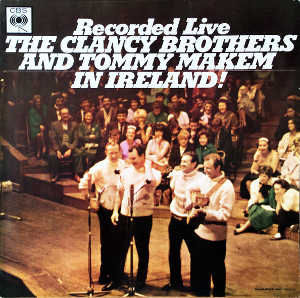
Recorded Live in Ireland is a 1965 album of Irish folk songs performed by The Clancy Brothers and Tommy Makem. It was the first live album to be recorded in stereo in Ireland. It was their sixth LP for Columbia Records and, unusually for the group, included two newly composed songs in the folk style. Music critic Joe Goldberg wrote the liner notes.
"The Sea Around Us" is an Irish folk song written by Dominic Behan. A version recorded by The Ludlows reached number one in the Irish Singles Chart in 1966. Other versions have been recorded by Dermot O'Brien, The Dubliners, Patsy Watchorn and Ron Kavana.
References
- ↑ "The Irish Rover", published by Doug Dobell, no. F-LEUT-2
- 1 2 George Petrie: Ancient Music of Ireland, M. H. Gill, Dublin, 1855 (re-printed 2005, University of Leeds, ISBN 978-1-85918-398-4)
- ↑ 50 Great Irish Love Songs. Music Ireland, 2008
- ↑ Biological sciences, Royal Society of Edinburgh (1983), p. 623.
- ↑ "Carrickfergus - the real truth about the lyrics to one of Ireland's most haunting ballads". 9 August 2021.
- ↑ https://kilkennyarchaeologicalsociety.ie/wp-content/uploads/2020/08/OKR1948-14-Claire-Murphy-The-Kilkenny-Marble-Works.pdf
- ↑ "HBO: Boardwalk Empire: S 1 EP 5: Music". 26 December 2015. Archived from the original on 26 December 2015. Retrieved 29 July 2021.
- ↑ "Александр О'Карпов | Песни и стихи | Каррикфергус". karpov.hole.ru. Retrieved 11 September 2016.
- ↑ Sheeran, Ed. "Galway Girl." Divide. By Ed Sheeran. Perf. Ed Sheeran. Recorded 2016. Producer(s) Mike Elizando, Ed Sheeran, 2017. CD